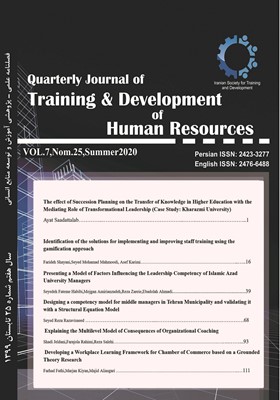-
-
List of Articles
-
Open Access Article
1 - Identification of the solutions for implementing and improving staff training using the gamification approach
Seyed Mohammad Mahmoudi Farideh Shayani Asef Karimi -
Open Access Article
2 - Presenting a Model of Factors Influencing the Leadership Competency of Islamic Azad University Managers
سیده فاطمه حبیبی Mojghan Amirianzadeh reza zarei Ebadalah Ahmadi -
Open Access Article
3 - Designing a competency model for middle managers in Tehran Municipality and validating it with a Structural Equation Model
Seyed Reza Razavi Saeedi -
Open Access Article
4 - Explaining the Multilevel Model of Consequences of Organizational Coaching
Shadi Jaldani Faraj Allah Rahimi Reza Salehi -
Open Access Article
5 - The effect of Succession Planning on the Transfer of Knowledge in Higher Education with the Mediating Role of Transformational Leadership (Case Study: Kharazmi University)
Ayat Saadat Talab -
Open Access Article
6 - Developing a Workplace Learning Framework for Chamber of Commerce based on a Grounded Theory Research
Farhad Fathi Marjan Kian Majid Ali Asgari
-
The rights to this website are owned by the Raimag Press Management System.
Copyright © 2017-2026







